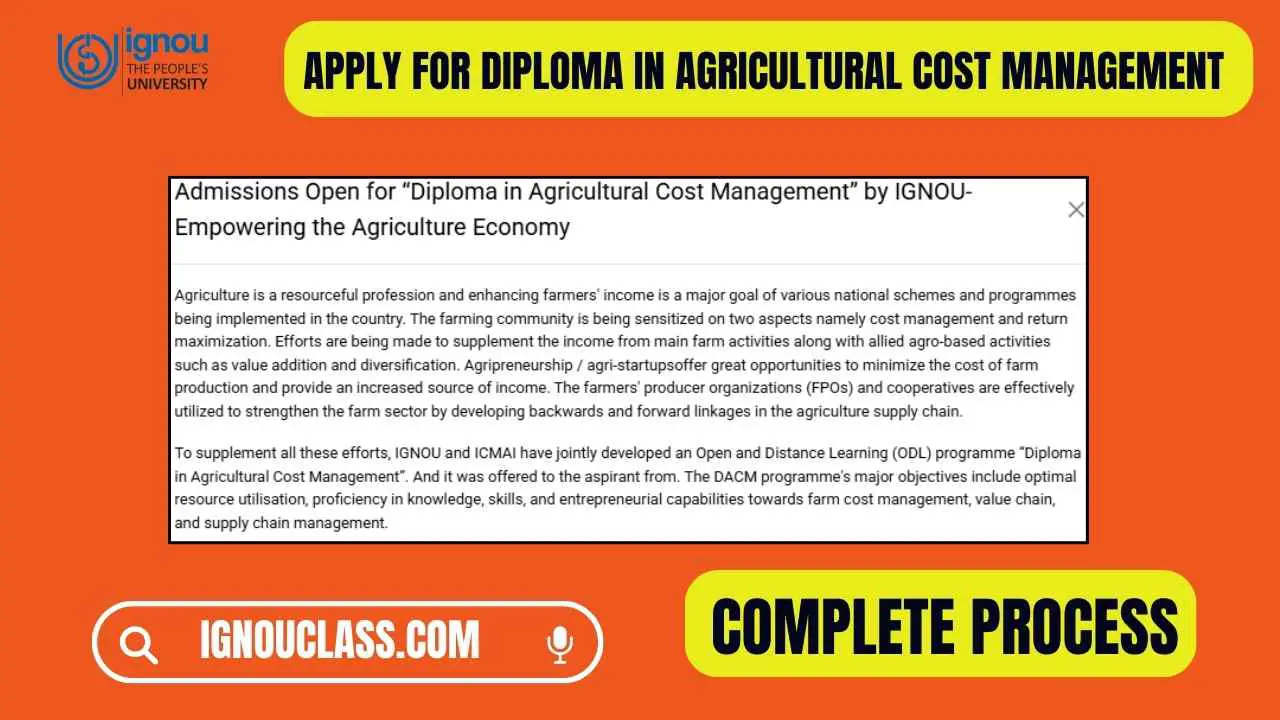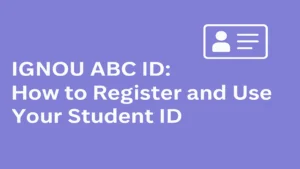Agriculture has always been the backbone of many economies, and in countries like India, it plays a central role in sustaining livelihoods and contributing to economic development. However, despite its immense potential, the agricultural sector faces multiple challenges, including low income, inefficient resource management, and a lack of skilled manpower. The demand for improving farm productivity and reducing costs has led to the development of various educational programs aimed at empowering individuals with the knowledge and skills required to tackle these issues.
One such program that stands out is the Diploma in Agricultural Cost Management (DACM) offered by IGNOU (Indira Gandhi National Open University). This course, which is now open for admission, is designed to equip students with the tools to optimize farm operations, increase profitability, and promote agripreneurship. In this article, we’ll explore everything you need to know about the program, from the curriculum and benefits to who should apply and how to enroll.
Introduction: The Role of Education in Revolutionizing Agriculture 🌱🎓
Education has always played a pivotal role in the transformation of any sector, and agriculture is no exception. In India, farming communities are increasingly recognizing the need for a more scientific and business-oriented approach to agriculture. With government schemes focusing on boosting farmers’ incomes, education programs like the DACM are stepping in to fill the knowledge gap.
This program offers a unique opportunity for individuals to gain in-depth knowledge of cost management techniques, agripreneurship, and the management of agricultural resources—skills that are essential for improving farm efficiency and sustainability.
Why Agricultural Cost Management is Crucial for Farmers 💡💰
Cost management is a critical aspect of farm operations that directly affects the financial health of agricultural enterprises. In traditional farming practices, a lack of focus on cost control often leads to poor profitability and even losses. By managing costs effectively, farmers can optimize resource utilization, reduce wastage, and improve their bottom line.
For instance, crop cultivation, livestock rearing, and other farming activities require careful financial planning to ensure that input costs are justified by output. This program delves deep into these aspects, empowering farmers and agribusiness professionals to make strategic decisions based on cost-effective practices.
Key Benefits of Agricultural Cost Management:
- Increased Profitability: Lowering operational costs while increasing productivity.
- Resource Optimization: Effective allocation of limited resources (water, labor, capital).
- Sustainability: Ensuring long-term viability by reducing environmental impact and costs.
IGNOU’s Diploma in Agricultural Cost Management: An Overview 🏫🌾
What is IGNOU?
Indira Gandhi National Open University (IGNOU) is one of the largest and most prestigious open universities in India. Established in 1985, IGNOU has been at the forefront of providing accessible, quality education through distance learning. The university’s agricultural programs are designed to cater to the needs of rural and urban populations alike, making education accessible to everyone, regardless of location.
The Diploma in Agricultural Cost Management (DACM) is offered in collaboration with the Institute of Cost Accountants of India (ICMAI). It combines agricultural management principles with cost accounting techniques, making it ideal for those looking to work at the intersection of farming and business.
Key Features of the Program:
- Mode of Study: Open and Distance Learning (ODL), which allows students to study at their own pace.
- Duration: The course can be completed in 1 to 3 years, offering flexibility to working professionals.
- Target Audience: The program is designed for farmers, agripreneurs, agriculture students, and anyone interested in enhancing their knowledge of agricultural cost management.
Key Features of the Diploma Program 📝📊
Open and Distance Learning (ODL) Mode Benefits:
The ODL mode offers a unique advantage for individuals who may not have access to traditional classroom education, especially in remote rural areas. Students can access course materials, submit assignments, and participate in online exams without the need to attend physical classes.
This format is particularly beneficial for those who are already involved in agriculture or agribusiness but wish to enhance their skills and knowledge. It also offers flexibility for working professionals and entrepreneurs.
Program Duration and Flexibility:
- Minimum Duration: 1 year
- Maximum Duration: 3 years
This range of flexibility ensures that students can tailor the program according to their personal schedules and commitments.
Target Audience:
- Urban and Rural Youth: This program is ideal for students interested in joining the agriculture sector, whether they come from an urban or rural background.
- Entrepreneurs: Small and medium-sized business owners in agriculture will find this program especially useful in streamlining their operations and maximizing profits.
- Farmers’ Organizations and NGOs: Individuals working with farmers’ producer organizations (FPOs), cooperatives, and NGOs will benefit from this curriculum in improving organizational effectiveness and farm productivity.
- Progressive Farmers: Experienced farmers looking to scale their businesses and enhance farm efficiency can gain new insights through this program.
Who Should Enroll in This Program? 🌍👨🌾
Urban and Rural Youth:
The program targets individuals from both urban and rural backgrounds who are keen to pursue a career in agriculture. It’s an ideal opportunity for young people who want to understand modern agricultural practices and are interested in contributing to the agricultural economy.
Small and Medium Entrepreneurs:
The Diploma in Agricultural Cost Management equips entrepreneurs with the knowledge and skills to establish and manage successful agri-businesses, from small farms to larger operations. Entrepreneurs can learn how to reduce costs and improve profitability by understanding agricultural economics.
Farmers’ Organizations and NGO Functionaries:
Those working with farmers’ producer organizations (FPOs) or agricultural NGOs can utilize the program to better understand how to manage farming costs at the group level, implement efficient practices, and build stronger agricultural communities.
Progressive Farmers:
Farmers looking to integrate cost-effective strategies in their farming operations can benefit significantly. Whether you are involved in crop cultivation or livestock rearing, the program offers practical insights into cost management, helping farmers enhance both productivity and sustainability.
Eligibility Criteria: Who Can Apply? 📝
To apply for the Diploma in Agricultural Cost Management, applicants must meet the following requirements:
Minimum Educational Qualification:
- 10+2 in any discipline: This is the basic eligibility criterion for enrolling in the program.
The program is open to individuals from various educational backgrounds, making it accessible to a broad audience.
Application Process:
Students can apply online by visiting the official IGNOU Admission Portal https://ignouadmission.samarth.edu.in/ and following the instructions. Important deadlines and document requirements are listed on the website.
Last Date For Admission
The last date for admission is February 15, 2025. After then you will not be able for new admission.
Curriculum Breakdown: Courses Included in the Diploma Program 📚🌾
The Diploma in Agricultural Cost Management includes a comprehensive curriculum designed to equip students with essential skills and knowledge in agricultural management. Here’s an overview of the courses:
Basics of Agriculture:
This foundational course covers the essential principles and practices of agriculture. It provides an understanding of farming techniques, soil health, crop management, and more.
Institutional Support for Agricultural Development:
This course explores the various organizations and institutions that play a critical role in supporting agricultural development, including government schemes, NGOs, and agricultural finance institutions.
Cost Concepts and Techniques:
This course introduces students to the core concepts of cost accounting and cost management. It covers direct and indirect costs, break-even analysis, and cost-benefit analysis tailored to agriculture.
Farm Cost Management:
Students learn the principles and practices of managing costs within farm operations. The focus is on budgeting, financial planning, and effective allocation of resources to increase farm profitability.
Agripreneurship:
This course helps students explore the entrepreneurial side of agriculture. It provides the skills needed to start and run an agricultural business, including market research, funding, and scaling operations.
Managing Farmers’ Producer Organizations (FPOs):
This course teaches students how to effectively manage and lead farmers’ organizations. It focuses on leadership, coordination, and collaboration to ensure the success of FPOs in strengthening the agricultural community.
Learning Objectives: What Will You Gain? 🎯
Development of Cost Management Strategies:
Students will learn how to develop and implement cost management strategies that lead to enhanced profitability and sustainability.
Entrepreneurial Skills for Launching Agri-Ventures:
This program empowers students to become agripreneurs by equipping them with the skills to start and manage agricultural ventures, from production to marketing.
Resource Optimization and Financial Planning:
By learning to manage resources effectively and plan finances strategically, students will be able to optimize the productivity of farms and agricultural businesses.
Understanding the Supply Chain:
The program also emphasizes the importance of understanding and managing the agricultural supply chain, from production to distribution.
How the Diploma Program Enhances Agricultural Productivity 📈🌿
Cost management directly impacts farm productivity. By learning to manage inputs, farmers can improve their output-to-cost ratio, ensuring that each unit of input generates more value. Moreover, the program emphasizes resource optimization, helping farmers get the most out of their available resources (land, water, labor).
Agripreneurship and the Role of Agri-Startups 🚀🌱
Agriculture isn’t just about farming anymore—it’s about entrepreneurship. The growth of agri-startups has been revolutionary, bringing new ideas, technology, and business models to the sector. The program provides entrepreneurial skills that can help students develop innovative solutions to challenges faced by farmers and agribusinesses.
The Role of Farmers’ Producer Organizations (FPOs) in Agriculture 🤝🌾
Farmers’ producer organizations play a critical role in agricultural development. They allow farmers to pool their resources, share knowledge, and access better market opportunities. This program provides valuable insights into the management and leadership of FPOs.
Supporting the Agricultural Economy Through Effective Cost Management 💪🌍
Cost management in agriculture not only improves farm profitability but also contributes to the national economy by enhancing overall agricultural efficiency. By ensuring that costs are effectively managed, farmers can continue to contribute to food security and rural development.
Online Learning at IGNOU: Flexibility and Accessibility 📲💻
The ODL mode offers unparalleled flexibility for students, especially those who are already involved in agricultural activities. The self-paced learning model ensures that students can manage their studies alongside their work and personal commitments.
How to Fill the Application Form Online for the Diploma in Agricultural Cost Management 💻📝
If you’re interested in enrolling in the Diploma in Agricultural Cost Management (DACM) at IGNOU, follow these simple steps to complete your application online. Please read the instructions carefully before proceeding to ensure a smooth application process.
Step 1: Visit the Online Admission Portal 🌐
To begin, go to the IGNOU Online Admission System. If you are a first-time applicant, click on the “Available Programmes” tab on the homepage. From here, select the Diploma in Agricultural Cost Management (DACM) program. Carefully read the program details, including:
- Eligibility criteria
- Fee structure
- Duration of the course
- Other important details
Step 2: Download the Common Prospectus 📄
Before starting your application, download the Common Prospectus available on the admission portal. The prospectus contains important university rules, application guidelines, and other essential information. Make sure to read it carefully to understand the application process and university regulations.
Step 3: Register as a New Applicant 🖊️
Once you’ve reviewed the program details, click on the “NEW REGISTRATION” button located in the applicant login area. You will need to provide the following mandatory details:
- Email ID: Ensure you use your own valid email address.
- Mobile Number: Provide an active mobile number for communication.
- UserName: Your username must be between 8 to 16 characters.
- Password: Choose a secure alphanumeric password that is 8 to 16 characters long.
After filling in the required information, click on the “SUBMIT” button.
Step 4: Receive Confirmation of Registration 📧📱
After submission, your username will be sent to you immediately via email and SMS. Make sure to note down your username and password for future logins.
If you’ve already registered and are a returning applicant, simply click the “LOGIN” button to continue.
Step 5: Prepare Required Documents 🗂️
Before filling out the online application, ensure you have the following scanned documents ready to upload:
- Photograph (less than 100 KB)
- Signature (less than 100 KB)
- Educational Qualification Certificate (less than 200 KB)
- Experience Certificate (if any) (less than 200 KB)
- Category Certificate (SC/ST/OBC) (if applicable) (less than 200 KB)
Make sure your scanned copies are clear and legible.
Step 6: Fill Out the Application Form 📝
Now, proceed to fill out the application form. Review the information and ensure everything is correct before moving on. Once the form is complete:
- Click the “Next” button to proceed.
- You will be shown a Form Preview; save or print it for future reference.
Step 7: Pay the Application Fee 💳
The application fee can be paid using the following methods:
- Credit Card (Master/Visa)
- Debit Card (Master/Visa/Rupay)
- Net Banking
Make sure to pay the fee before submitting your application. Keep the transaction details for reference.
Step 8: Final Submission & Confirmation ✅
Once you’ve completed all the steps, submitted the necessary documents, and paid the fee, click “Submit”. Your application will be processed, and you’ll receive confirmation via email.
Step 9: Registration Fee and Refund Policy 💵
Please be aware of the non-refundable registration fee. If you wish to cancel your admission, note the following refund policy:
- Before Confirmation: Fee is refundable.
- After Confirmation: A 15% deduction of the program fee (up to a maximum of Rs. 2,000) will be applied.
- Refund for Soft Copy Study Material: Only the Registration Fee will be refunded after deducting this amount.
- Fee Exemption: In case of fee exemption, only the Development Fee will be refunded upon cancellation.
No refund will be provided 60 days after the admission closing date.
Step 10: Help and Support 🆘
If you face any issues during the application process, please consult the Common Prospectus for detailed guidance or visit the help section on the IGNOU admission portal for assistance.
Conclusion: Why This Diploma is a Game-Changer for Agriculture 🚀🌾
The Diploma in Agricultural Cost Management offers a holistic approach to improving agricultural productivity, entrepreneurship, and cost management. With its emphasis on practical skills and flexibility, it is a game-changer for anyone looking to make a real impact in the agricultural sector.
FAQs: Common Questions About the Diploma in Agricultural Cost Management 🤔
What is the eligibility criteria for the Diploma in Agricultural Cost Management?
To be eligible for the Diploma in Agricultural Cost Management (DACM), applicants must have completed 10+2 in any discipline. The program is open to individuals from various educational backgrounds, making it accessible to a broad audience, including those who are already working in agriculture or agribusiness.
What is the duration of the program?
The Diploma in Agricultural Cost Management can be completed within 1 to 3 years. This flexible duration allows students to tailor the program to their personal schedules, whether they are full-time students or working professionals involved in agriculture.
How can I apply for the program?
To apply for the Diploma in Agricultural Cost Management, you need to visit the official IGNOU Admission Portal (https://ignouadmission.samarth.edu.in/) and complete the online application process. Make sure to check the application deadlines and provide the necessary documents as specified on the website.
What are the key benefits of this program?
The program helps you develop critical skills in cost management, farm resource optimization, and agripreneurship. By the end of the course, you will have the tools to increase farm profitability, improve resource allocation, and even start your own agri-business or manage farmers’ producer organizations (FPOs). It is an excellent opportunity for those looking to make a real impact in the agriculture sector.
What are the career opportunities after completing this diploma?
Upon completing the Diploma in Agricultural Cost Management, you can explore various career paths, such as:
Farm Manager
Agribusiness Consultant
Agricultural Entrepreneur
NGO/Development Sector Specialist
Farmers’ Producer Organization (FPO) Manager
The knowledge and skills gained from this program can help you work with farmers’ cooperatives, agriculture-related NGOs, or even government agricultural schemes, or you could start your own agri-business venture.
Related Posts:
- Calm Your Nerves: Quick Stress Relief Techniques Before IGNOU Result Day 2025
- IGNOU Assignments Evaluation 2025: What Examiners Look For
- IGNOU Assignments: How to Choose the Right Sources 2025
- Download IGNOU Previous Year Question Papers Online: Best Guide 2025
- How IGNOU Exams Results Are Calculated: Grading System, Pass Marks, and Back Papers 2025




